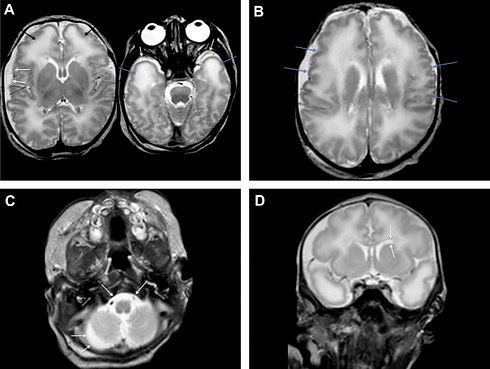GALLOWAY-MOWAT SYNDROME
Brief Summary
Galloway-Mowat syndrome is an extremely rare genetic disorder that is characterized by a variety of physical and developmental abnormalities, particularly neurological abnormalities and early onset progressive kidney disease.
Frequency
Males and females are equally affected by Galloway-Mowat syndrome. In the medical literature, more than 70 instances have been recorded. It's difficult to estimate the real prevalence of Galloway-Mowat syndrome in the general community since instances might be misdiagnosed or go untreated.
Frequency
Galloway-Mowat syndrome is inherited in an autosomal recessive manner.
History of Disease
Galloway-Mowat syndrome was first described in the medical literature in 1968 in two siblings who had microcephaly, hiatal hernia and kidney disease. Galloway-Mowat syndrome can be diagnosed after birth (postnatally) by a thorough clinical evaluation, characteristic physical findings, specialized laboratory tests, imaging techniques, and genetic testing. Several main symptoms associated with the disorder such as nephrotic syndrome, and a small brain (microcephaly) may be obvious at birth.


Pathogenesis
Achondroplasia is caused by a mutation in the FGF3 gene in chromosome 4 at 4p 16.3. This mutation causes a decreased production of fibroblast growth factor receptor 3 which is crucial in the conversion of cartilage into bone which is vital in the proper development of a person. This mutation is inherited in an autosomal dominant manner. More than 80 percent of people with achondroplasia have parents with normal characteristics and are born with achondroplasia due to a recent (de novo) gene modification (mutation).
Pathogenesis
Galloway-Mowat syndrome appears to be genetically heterogeneous and is believed to be inherited in an autosomal recessive manner, a significant proportion of cases identified to date have been shown to be caused by biallelic alterations (mutations) in the WDR73 gene.
Symptoms
1
microcephaly (smaller head circumference than expected)
2
hiatal hernia (protrusion of part of the stomach through an abnormal opening in the diaphragm)
3
dystonia (muscle spasms and abnormal movements)
4
generalized hypotonia (diminished muscle tone throughout the body)
5
nystagmus
 |  |  |  |
|---|---|---|---|
 |  |
Social Concerns
Microcephaly is a condition that has no cure and it can be lifelong. This is one of the social conern of having Galloway-mowat Syndrome because a child will have a small head compared to others which may lead to bullying. Treatment is only focused on reducing the problems related to having a small head and maximizes the child's abilities. Another condition under Galloway-mowat Syndrome that will have a social impact on a child is the nephrotic syndrome. Children with this syndrome tend to be depressed, hyperactive or have aggressive behavior. Somatic complaints, social withdrawal and poor school performance were also observed in affected children.
Treatment
Treatment is directed toward the specific symptoms that are apparent in each individual and may require the coordinated efforts of a team of specialists. Pediatricians, kidney specialists (nephrologists), gastroenterologists, neurologists, surgeons, physical therapists, and/or other healthcare professionals may need to work together to ensure a systematic, comprehensive approach to treatment. Genetic counseling may be of benefit for affected individuals and their families.
Treatment for nephrotic syndrome may include a low-sodium diet with low levels of protein, albumin infusion, and vitamins, thyroid and mineral supplementation. The edema associated with nephrotic syndrome may be treated with medications that promote the excretion of urine (diuretics). Drug therapy may also include antibiotics to help fight infection. Treatment with corticosteroids and/or immunosuppressive drugs has not been effective for nephrotic syndrome associated with Galloway-Mowat syndrome.






